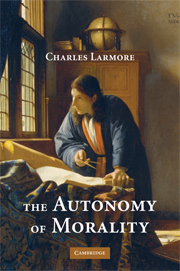Introduction: Response and Commitment
Published online by Cambridge University Press: 05 June 2012
Summary
In an earlier collection of essays, The Morals of Modernity, I argued that our moral self-understanding, even at its most fundamental, needs to draw upon the distinctive forms of modern experience. All our thinking is shaped by our historical context. Philosophy is no exception and, committed as it is to being fully explicit about its assumptions and goals, it ought to acknowledge the ties of time and place that give it substance and direction. I have not abandoned this conviction, as many of the essays in the present volume attest. Yet I have also gone on to pursue a lot further another theme in the earlier volume that is very much at odds with a dominant strand of modern thought.
The principles by which we determine what to believe or do must in the end, so it is often held, be principles of our own making. Once the Enlightenment has undone the notion that they are imposed on us by a higher being, and the Scientific Revolution shown that they cannot be read off the fabric of the world, which is now seen to be normatively mute and devoid of directives, the conclusion appears inescapable that we alone must be their source. The authority of any principle of thought and action is an authority we bestow upon it ourselves. This idea of the autonomy of reason, far more common than the Kantian tradition from which the term itself derives, seems to me profoundly mistaken.
Information
- Type
- Chapter
- Information
- The Autonomy of Morality , pp. 1 - 16Publisher: Cambridge University PressPrint publication year: 2008
